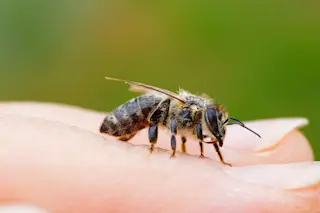Jamie Ellis has experienced thousands of bee stings in his lifetime. Ellis, a professor in the entomology and nematology department at the University of Florida, admits to experiencing between 400 and 450 stings in a single day while conducting research. Even after experiencing many stings, he says they are still painful.
“You never really get immune to the pain,” Ellis says.
Bees work hard to defend their hive, and causing pain to an organism they want to drive away as quickly as possible is their goal. Still, when stung, some individuals experience more than just pain: they might suffer an allergic reaction. In a 2022 study in Clinical Case Reports, researchers found that up to 5 percent of people in Europe and the U.S. have an allergic reaction to a bee or wasp sting, with varying degrees of severity.
“There's about five or six levels of reactions that one can ...















